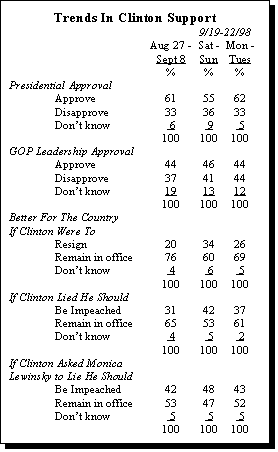Introduction and Summary

Televised release of President Clinton’s grand jury testimony is stemming a decline in his public support. Strong opposition to the release of the grand jury videotape and increased disapproval of Republican congressional leadership accompany the reversal of the trend against Clinton. However, on balance, those who viewed the testimony have a negative opinion of his performance.
A Pew Research Center survey this weekend found a decline in Clinton’s job approval rating and an increase in the percentage of Americans saying he should resign or be impeached and removed from office if he lied. But a parallel follow-up survey conducted Monday and Tuesday finds these trends abating as the public expresses nearly two-to-one opposition to the airing of Clinton’s videotaped testimony.
The President’s rebound in public support coincides with increased disapproval of GOP leaders on Capitol Hill. An early September survey found 44% of the public approving and 37% disapproving of them. The survey conducted after the video was aired finds the public equally divided between those approving and disapproving of the Republican leadership. (See box.)
Nonetheless, the feeling that the President should resign or be removed from office is somewhat more prevalent in the post-video survey than it was in early September. The fall-off in support for Clinton over the weekend suggests that the negative impact of the release of the Starr report took some time to manifest itself.
Even though the President is benefiting from a backlash to the release of his testimony, he does not come out well in the eyes of Americans who saw it. By a 50%-38% margin, those who watched do not think he made a good case for himself. Similarly, his testimony lost rather than won him personal sympathy (43%-32%). More viewers saw the prosecutors as fair in their questioning of him than unfair (54%-36%). People who watched all or most of the testimony (21% of the public) are more of the view that the President made a good case for himself than those who watched only part of the proceedings (48% of the public).

Other Findings:
- Opposition to the airing of Clinton’s videotaped testimony is greatest among women, non-whites and Democrats. By a margin of 56%-37%, Americans also think that the news media made a bad decision in airing reports about Republican Congressman Henry Hyde’s extramarital affair of 30 years ago.
- The survey conducted after Clinton’s testimony aired finds a 44% plurality favoring a censure or reprimand, compared to 26% favoring impeachment, and 26% no formal action. Even Republicans are divided on whether it would better to impeach (46%) or censure Clinton (41%).
- Similarly, the surveys find 56% of Americans continuing to say they would have an unfavorable opinion of members of Congress who voted for beginning hearings.



